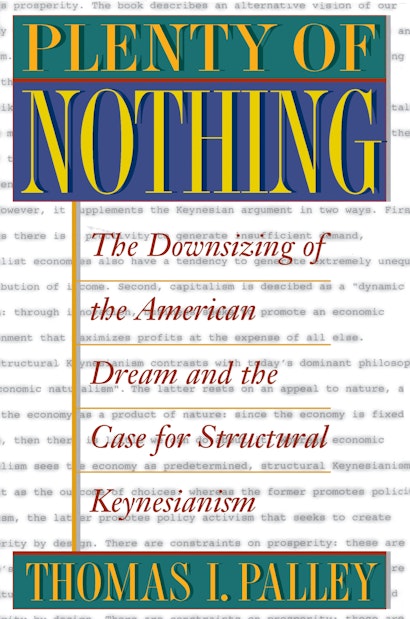Plenty of Nothing: The Downsizing of the American Dream and the Case for Structural Keynesianism


Paperback
- Price:
- $57.00/£45.00
- ISBN:
- Published:
- Jul 16, 2000
- Copyright:
- 1998
- Pages:
- 264
- Size:
- 6 x 9.25 in.
- 46 line illus. 21 tables
- Main_subject:
- Economics & Finance
ebook
Business papers today are in a triumphant mood, buoyed by a conviction that the economic stagnation of the last quarter century has vanished in favor of a new age of robust growth. But if we are doing so well, many ask, why does it feel like we are working harder for less? Why, despite economic growth, does inequality between rich and poor keep rising? In this wide-ranging and provocative book, Thomas Palley pulls together many threads of “new liberal” economic thought to offer detailed answers to these pressing questions. And he proposes a new economic model—structural Keynesianism—that he argues would return America to sustainable, fairly shared prosperity. The key, he writes, is to abandon the myth of a natural competitive economy, which has justified unleashing capital and attacking unions. This has resulted in an economy dominated by business.
Palley’s book, which began as a cover article for The Atlantic Monthly in 1996, challenges the economic orthodoxies of the political right and center, popularized by such economists as Milton Friedman and Paul Krugman. He marshals a powerful array of economic facts and arguments to show that the interests of working families have gradually been sacrificed to those of corporations. Expanding on traditional Keynesian economics, he argues that, although capitalism is the most productive system ever devised, it also tends to generate deep economic inequalities and encourage the pursuit of profit at the expense of all else. He challenges fatalists who say we can do nothing about this—that economic insecurity and stagnant wages are the inevitable results of irresistible globalization. Palley argues that capitalism comes in a range of forms and that government can and should shape it from a “mean street” system into a “main street” system through monetary, fiscal, trade, and regulatory policies that promote widespread prosperity.
Plenty of Nothing offers a compelling alternative to conventional economic wisdom. The book is clearly and powerfully written and will provoke debate among economists and the general public about the most stubborn problems in the American economy.
Awards and Recognition
- One of Choice's Outstanding Academic Titles for 1998